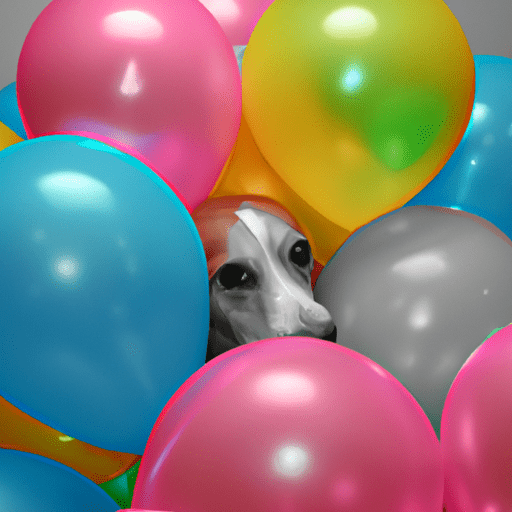Imagine this: You’re celebrating a friend’s birthday, and just like every other year, you have balloons hanging around your home. Your furry friend, who usually partakes in the revelry, is suddenly hiding under the table, shaking. This might leave you wondering, “Why are dogs afraid of balloons?“
Table of Contents
- Understanding the Fear
- Potential Triggers for Balloon Phobia
- How to Help Your Dog Overcome Their Fear
- Frequently Asked Questions
Dogs, much like humans, have their own fears and anxieties. The fear of balloons is not uncommon among our canine friends. This fear can be attributed to a variety of factors, from the balloon’s unpredictable movements to the loud noise it makes when popped. Understanding your dog’s fear can help you devise strategies to alleviate their anxiety.
Key Takeaways
- Dogs can be afraid of balloons due to their unpredictable movements and the loud noises they make.
- Sensitivity to noise and past traumatic experiences can be potential triggers for balloon phobia.
- Gradual exposure combined with positive reinforcement can help dogs overcome their fear.
- Always consult with a professional if your dog’s fear seems severe or is causing significant distress.
Understanding the Fear
Dogs are naturally curious and playful creatures. However, they are also highly sensitive to their surroundings. Balloons, with their erratic movements and potential to pop suddenly, can easily startle dogs and trigger their fear responses. According to a study on canine behavior, dogs exhibit fear when they perceive a threat. The unpredictable nature of balloons can make them seem threatening to some dogs.
Potential Triggers for Balloon Phobia
Several factors may contribute to a dog’s fear of balloons. These include:
-
Noise Sensitivity: Dogs have a heightened sense of hearing. The loud pop of a bursting balloon can be startling and frightening to them.
-
Past Trauma: If a dog has had a negative experience with a balloon in the past, such as being hit by a flying balloon or being near one when it popped, it may develop a fear of balloons.
-
Unpredictable Movements: Balloons tend to move randomly in the air, especially when they’re filled with helium. This unpredictable movement can be unsettling for dogs.
How to Help Your Dog Overcome Their Fear
Helping your dog overcome their fear of balloons may take time and patience. Here are some strategies that can help:
-
Gradual Exposure: Start by introducing your dog to deflated balloons. Allow them to investigate and get familiar with the object in a controlled, calm environment.
-
Positive Reinforcement: Reward your dog with treats or praise whenever they show curiosity or bravery towards the balloon.
-
Professional Help: If your dog’s fear seems severe, it may be helpful to consult with a professional dog trainer or a veterinary behaviorist.
You can learn more about these techniques in this article on dog behavior training from OneTopDog.
Frequently Asked Questions
Q: Are all dogs afraid of balloons?
A: No, not all dogs are afraid of balloons. It largely depends on the individual dog’s temperament, past experiences, and sensitivity to noise.
Q: What should I do if my dog is terrified of balloons?
A: If your dog is extremely scared, it may be best to remove the balloons from their environment. You can also try to desensitize your dog to balloons using the strategies mentioned above.
Q: Can a dog’s fear of balloons lead to other problems?
A: If not addressed, a dog’s fear of balloons could potentially lead to more generalized fear or anxiety. It’s important to tackle the issue early on to prevent it from escalating.
Understanding your dog’s fear of balloons can help you create a more comfortable and stress-free environment for them, especially during celebrations. Remember, it’s always important to respect your dog’s fears and not force them into uncomfortable situations. Always consult with professionals if you’re unsure about how to handle your dog’s phobia. For more information on managing your dog’s fears, you can check out these articles from OneTopDog: Understanding Dog Anxiety and Helping Your Dog Overcome Fears.



